► Close race won by Kia EV6
► Sister car from Hyundai takes bronze
► First Korean car to win CotY
Kia’s all-electric EV6 has become the first Korean automobile to win Car of the Year, after landing the most votes from a jury of 59 European journalists from 22 countries. The award was announced today (Monday 28 February) at Geneva Palexpo, typically home of the Geneva motor show but fallow again this year due to Coronavirus’s longstanding effect on public events.
Six electric cars made the shortlist from the 38 eligible cars launched in 2021; the Peugeot 308 was the only combustion engine car in the running. Here’s the seven-strong shortlist and their total scores, received from the motoring journalists sitting on the jury.
1) Kia EV6 – 279 points
2) Renault Megane e-Tech Electric – 265 points
3) Hyundai Ioniq 5 – 261 points
4) Peugeot 308 – 191 points
5) Skoda Enyaq iV – 185 points
6) Ford Mustang Mach-E – 150 points
7) Cupra Born – 144 points
The award is decided by motoring journalists (including Car’s Phil McNamara) from 22 European countries. Each juror distributes 25 points between the seven cars, with the top-scoring car becoming Car of the Year. It’s an independent trophy funded by nine European motoring titles, and is truly democratic with the award simply going to the car that secures the most votes from across Europe.
The jury actually comprises 61 members, but the two Russian members stood aside over the past weekend and gave up their votes, as a consequence of the tragic invasion of Ukraine.
Here’s a run-down of the seven contenders, in alphabetical order.
Contender 1: the Cupra Born
The Born is Cupra’s version of the VW ID.3, but with more sophisticated interior materials and a more aggressive exterior design. Will that be enough to bag the CotY crown, given the iD.3 and its identical 204PS powertrain, 58kWh battery and cabin space – only came fourth last year?

Curtis Moldrich reviewed the Born for Car, concluding: ‘In isolation, the Cupra Born is an impressive bit of kit. Stylish, with more than enough power for urban environments, it also feels a touch sporty when you get past the city limits. However, the biggest problem for the Cupra comes in the form of its MEB-powered VW counterpart.’
It’s another strong showing from Cupra, whose Formentor crossover took the third step on the CotY podium last year.
Contender 2: Ford Mustang Mach-E
Ford’s Mustang Mach-E is a clean-sheet electric car, sharing nothing with sibling models unlike the Hyundai and Kia, Cupra and Skoda, and Renault Megane e-Tech which has a common platform with Nissan’s forthcoming Ariya.
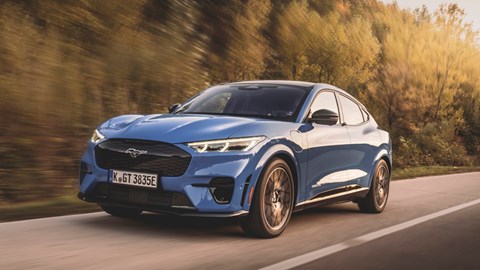
The crossover, featuring design cues – such as the rear light bar – inspired by Ford’s famous Mustang muscle car, can travel 379 miles in base rear-wheel drive form, or blast from 0-62mph in 3.7secs with the flagship GT.
‘Buyers of the Mustang Mach-E are likely to be drawn in by the driving range and tech on offer. The fact it’s great fun to drive and has a horsey badge are just attractive extras,’ was Car’s verdict after our first drive.
The Korean contenders: Hyundai and Kia
Hyundai’s Ioniq 5 has a spectacular design and a broad range. It starts at £36,995 for the 58kWh, rear-wheel drive entry-level model, rising to £48,145 for the all-wheel drive version with the biggest, 73kWh battery pack.
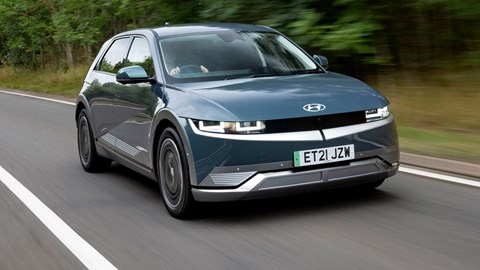
Car’s Jake Groves was blown away by the Hyundai. ‘The Ioniq 5 brings such breadth of ability that other electric family cars can only dream of. It’s an absolute show-stopper to look at, it has a thoroughly usable and appealing interior brimming with technology and neat tricks, it’s quick and its handling treads a fine balance between sporty and comfortable.’
But the Ioniq 5 faces stiff competition from sister brand Kia’s EV6. In the UK it’s only available with a 77kWh battery, which means a slightly higher, £40,945 price for the rear-wheel drive model capable of 328 miles of range. There’s also a 577bhp GT model coming in 2022, with a claimed 0-62mph sprint in 3.5secs.
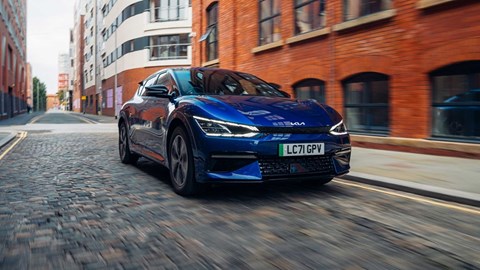
Car’s verdict? ‘There’s no denying that the Kia EV6 is a hugely capable EV that sits comfortably among traditionally more prestigious rivals and more than holds its own. The range, charging speeds, tech, overall drive and inevitable reliability are all selling points in their own right, yet put them together and they bring the EV6 close to being a five-star car.’
The one and only petrol car: Peugeot’s 308
Peugeot is undoubtedly the form team when it comes to Car of the Year: the outgoing 308, 3008 and 208 have all claimed the crown in the last 10 years. While the new 308 hatchback does come with a plug, it’s to charge the 12kWh battery pack in the two hybrid models. One petrol and one diesel engine will be also available, along with the sleek SW bodystyle, when it hits the UK market in 2022.
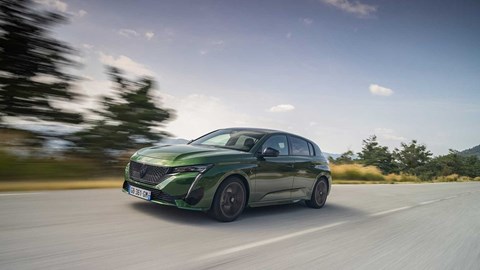
When Car drove it back in September, we concluded: ‘The 308 offers a strong range with the handsome but practical estate, an agile petrol for eager drivers, a pure electric version from 2023 and two plug-in hybrids at launch. The Hybrid 180 is the engine to pick – so long as you can plug it in. Its refined, sophisticated air makes it the top cat right now.’
Two electric hatches complete the set
Renault’s Megane E-Tech Electric – the GTI of EVs according to company CEO Luca de Meo – looks to be a strong contender. UK prices are yet to be finalised – it doesn’t come to the UK until autumn 2022 – but will cost around €35,000 in mainland Europe. There are two battery packs, 129 and 215bhp electric motors, and a range of 186- or 292-miles.
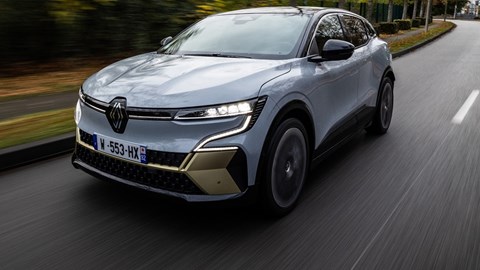
‘The Megane Electric is smooth-riding, sharp-looking, efficient-running and its interior is up there with the best in class. Pretty engaging to drive too, if not quite the electric GTI Renault’s promising,’ concluded Car.
And the final contender? Skoda’s all-electric Enyaq iV crossover, which edged out two related cars – the Audi Q4 e-tron and VW ID.4 – to get on the shortlist. The entry-level 60 model, with a 256-mile range, costs from £32,010.
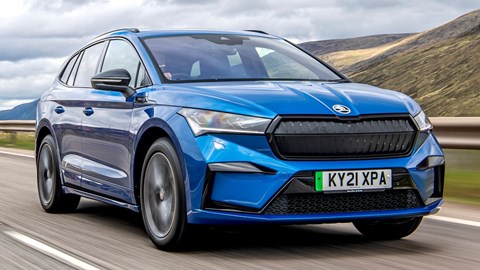
‘As an electric SUV, it’s hard not to be impressed with its all-round competence, with all the comfort, space and long-distance cruising ability most people would ever need from a family car of this type,’ wrote Keith Adams in his review for Car.
What didn’t make the list?
It was another lean year for all-new models, with just 38 cars eligible for consideration due to Covid-related supply chain issues causing havoc for the car industry.
Notable omissions included the third-generation Nissan Qashqai, which gets a promising-sounding range extender hybrid, the ePower version in 2022: it came eight when jurors nominated their shortlists. Mercedes’ new C-Class, the Tesla Model Y (watch Car’s video review here) and BMW’s likeable i4/4-series also missed out.
Car’s Phil McNamara was disappointed Mercedes’ sublime EQS electric limousine – with up to 484 miles of range and brimful of advanced technology – didn’t make the shortlist. While it ticks the ‘technical innovation’ box that CotY jurors are asked to assess, its £99,995 UK price makes it a highly aspirational electric car.
But the beauty of Car of the Year is it’s a democratic process, and the 61 member jury has collectively selected the more attainable of this year’s bumper crop of electric cars. What do you think of the shortlist? Be sure to comment in the section below.